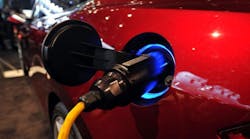Latest from Economic Data
Electrical Marketing - December 20, 2024
Advanced batteries used for utility energy storage and to power longer-range electric vehicles (EVs) grew to near $4 billion in total global sales through the third quarter of 2016 and demand trends point to further growth according to a recent study by Navigant Research.
The report, titled Advanced Battery Tracker 4Q16, found that through 3Q 2016, demand for batteries as an alternative means to power EVs and support grid management systems showed steady growth and continues to grow globally due to the expansion of plug-in EVs and stationary grid-tied energy storage systems. Lithium ion (Li-ion) remains the primary chemistry for light duty automotive applications, while the stationary energy storage sector has a more diverse chemistry landscape with technologies ranging from sodium sulfur and flow batteries to advanced lead-acid and hybrid chemistries, Navigant reported. The firm said the shipment volume of advanced batteries through 3Q 2016 equates to more than 323.5 million individual battery cells and $3.8 billion in sales.
“Markets for both EV batteries and stationary energy storage are transitioning from heavily subsidized, pilot program-based industries to more economically viable systems as the confluence of regulatory policy, technological capabilities, and business models continue to drive interest forward,” said Ian McClenny, research associate with Navigant Research, in a release. “This transition is expected to see continued lower advanced battery pricing and maturing energy storage technology and delivery chains, leading to a healthier and more economically stable energy storage industry.”
The introduction of mass-market battery EVs with ranges 200 or more miles has significant implications for the PEV market and EV service providers that supply the electricity to the vehicles, according to the report. Meanwhile, in the stationary storage market, advances in resiliency and improved power quality are important drivers for energy storage customers across all sectors.











